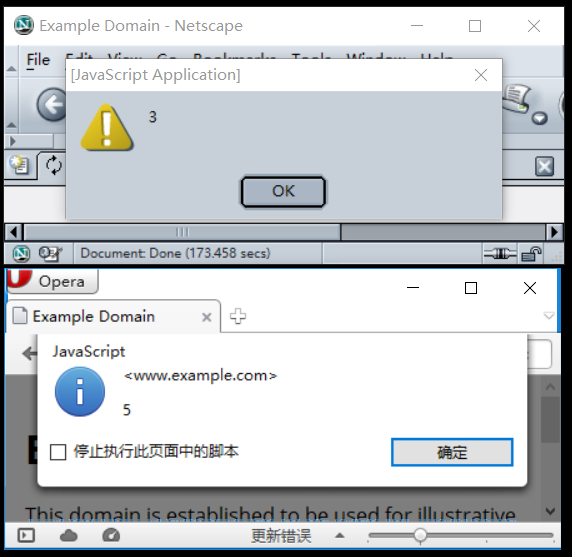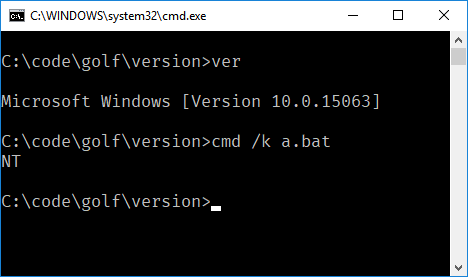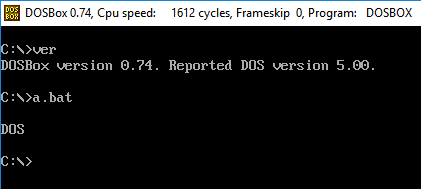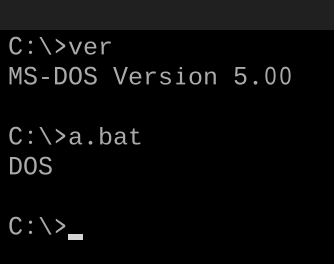x86 16/32/64-bit machine code: 11 bytes, score= 3.66
This function returns the current mode (default address-size) as an integer in AL. Call it from C with signature uint8_t modedetect(void);. (Or more realistically, from machine code that's going to branch on the result using instruction encodings that decode the same in all modes.)
NASM machine-code + source listing (showing how it works in 16-bit mode, since BITS 16 tells NASM to assemble the source mnemonics for 16-bit mode.)
1 machine global modedetect
2 code modedetect:
3 addr hex BITS 16
5 00000000 B040 mov al, 64
6 00000002 B90000 mov cx, 0 ; 3B in 16-bit. 5B in 32/64, consuming 2 more bytes as the immediate
7 00000005 FEC1 inc cl ; always 2 bytes. The 2B encoding of inc cx would work, too.
8
9 ; want: 16-bit cl=1. 32-bit: cl=0
10 00000007 41 inc cx ; 64-bit: REX prefix
11 00000008 D2E8 shr al, cl ; 64-bit: shr r8b, cl doesn't affect AL at all. 32-bit cl=1. 16-bit cl=2
12 0000000A C3 ret
# end-of-function address is 0xB, length = 0xB = 11
Justification:
x86 machine code doesn't officially have version numbers, but I think this satisfies the intent of the question by having to produce specific numbers, rather than choosing what's most convenient (that only takes 7 bytes, see below).
Another interesting way to interpret the question would be to write 16-bit code to detect 8086 vs. 186 vs. 286 vs. 386, etc, as in this example, based on FLAGS and other behaviour, because each new "version" added new features (including instruction opcodes). But that's not what this answer does.
The original x86 CPU, Intel's 8086, only supported 16-bit machine code. 80386 introduced 32-bit machine code (usable in 32-bit protected mode, and later in compat mode under a 64-bit OS). AMD introduced 64-bit machine code, usable in long mode. These are versions of x86 machine language in the same sense that Python2 and Python3 are different language versions. They're mostly compatible, but with intentional changes. You can run 32 or 64-bit executables directly under a 64-bit OS kernel the same way you could run Python2 and Python3 programs.
How it works:
Start with al=64. Shift it right by 1 (32-bit mode) or 2 (16-bit mode).
16/32 vs. 64-bit: The 1-byte inc/dec encodings are REX prefixes in 64-bit (http://wiki.osdev.org/X86-64_Instruction_Encoding#REX_prefix). REX.W doesn't affect some instructions at all (e.g. a jmp or jcc), but in this case to get 16/32/64 I wanted to inc or dec ecx rather than eax. That also sets REX.B, which changes the destination register. But fortunately we can make that work but setting things up so 64-bit doesn't need to shift al.
The instruction(s) that run only in 16-bit mode could include a ret, but I didn't find that necessary or helpful. (And would make it impossible to inline as a code-fragment, in case you wanted to do that). It could also be a jmp within the function.
16-bit vs. 32/64: immediates are 16-bit instead of 32-bit. Changing modes can change the length of an instruction, so 32/64 bit modes decode the next two bytes as part of the immediate, rather than a separate instruction. I kept things simple by using a 2-byte instruction here, instead of getting decode out of sync so 16-bit mode would decode from different instruction boundaries than 32/64.
Related: The operand-size prefix changes the length of the immediate (unless it's a sign-extended 8-bit immediate), just like the difference between 16-bit and 32/64-bit modes. This makes instruction-length decoding difficult to do in parallel; Intel CPUs have LCP decoding stalls.
Most calling conventions (including the i386 and x86-64 System V ABIs) allow narrow return values to have garbage in the high bits of the register. They also allow clobbering CX/ECX/RCX (and R8 for 64-bit). IDK if that was common in 16-bit calling conventions, but this is code golf so I can always just say it's a custom calling convention anyway.
32-bit disassembly:
08048070 <modedetect>:
8048070: b0 40 mov al,0x40
8048072: b9 00 00 fe c1 mov ecx,0xc1fe0000 # fe c1 is the inc cl
8048077: 41 inc ecx # cl=1
8048078: d2 e8 shr al,cl
804807a: c3 ret
64-bit disassembly (Try it online!):
0000000000400090 <modedetect>:
400090: b0 40 mov al,0x40
400092: b9 00 00 fe c1 mov ecx,0xc1fe0000
400097: 41 d2 e8 shr r8b,cl # cl=0, and doesn't affect al anyway!
40009a: c3 ret
Related: my x86-32 / x86-64 polyglot machine-code Q&A on SO.
Another difference between 16-bit and 32/64 is that addressing modes are encoded differently. e.g. lea eax, [rax+2] (8D 40 02) decodes as lea ax, [bx+si+0x2] in 16-bit mode. This is obviously difficult to use for code-golf, especially since e/rbx and e/rsi are call-preserved in many calling conventions.
I also considered using the 10-byte mov r64, imm64, which is REX + mov r32,imm32. But since I already had an 11 byte solution, this would be at best equal (10 bytes + 1 for ret).
Test code for 32 and 64-bit mode. (I haven't actually executed it in 16-bit mode, but the disassembly tells you how it will decode. I don't have a 16-bit emulator set up.)
global _start
_start:
call modedetect
movzx ebx, al
mov eax, 1
int 0x80 ; sys_exit(modedetect());
align 16
modedetect:
BITS 16
mov al, 64
mov cx, 0 ; 3B in 16-bit. 5B in 32/64, consuming 2 more bytes as the immediate
inc cl ; always 2 bytes. The 2B encoding of inc cx would work, too.
; want: 16-bit cl=1. 32-bit: cl=0
inc cx ; 64-bit: REX prefix
shr al, cl ; 64-bit: shr r8b, cl doesn't affect AL at all. 32-bit cl=1. 16-bit cl=2
ret
This Linux program exits with exit-status = modedetect(), so run it as ./a.out; echo $?. Assemble and link it into a static binary, e.g.
$ asm-link -m32 x86-modedetect-polyglot.asm && ./x86-modedetect-polyglot; echo $?
+ yasm -felf32 -Worphan-labels -gdwarf2 x86-modedetect-polyglot.asm
+ ld -melf_i386 -o x86-modedetect-polyglot x86-modedetect-polyglot.o
32
$ asm-link -m64 x86-modedetect-polyglot.asm && ./x86-modedetect-polyglot; echo $?
+ yasm -felf64 -Worphan-labels -gdwarf2 x86-modedetect-polyglot.asm
+ ld -o x86-modedetect-polyglot x86-modedetect-polyglot.o
64
## maybe test 16-bit with Bochs, e.g. in a bootloader, if you want.
7 bytes (score=2.33) if I can number the versions 1, 2, 3
There are no official version numbers for different x86 modes. I just like writing asm answers. I think it would violate the question's intent if I just called the modes 1,2,3, or 0,1,2, because the point is to force you to generate an inconvenient number. But if that was allowed:
# 16-bit mode:
42 detect123:
43 00000020 B80300 mov ax,3
44 00000023 FEC8 dec al
45
46 00000025 48 dec ax
47 00000026 C3 ret
Which decodes in 32-bit mode as
08048080 <detect123>:
8048080: b8 03 00 fe c8 mov eax,0xc8fe0003
8048085: 48 dec eax
8048086: c3 ret
and 64-bit as
00000000004000a0 <detect123>:
4000a0: b8 03 00 fe c8 mov eax,0xc8fe0003
4000a5: 48 c3 rex.W ret





(number of languages)^3 / (byte count). \$\endgroup\$